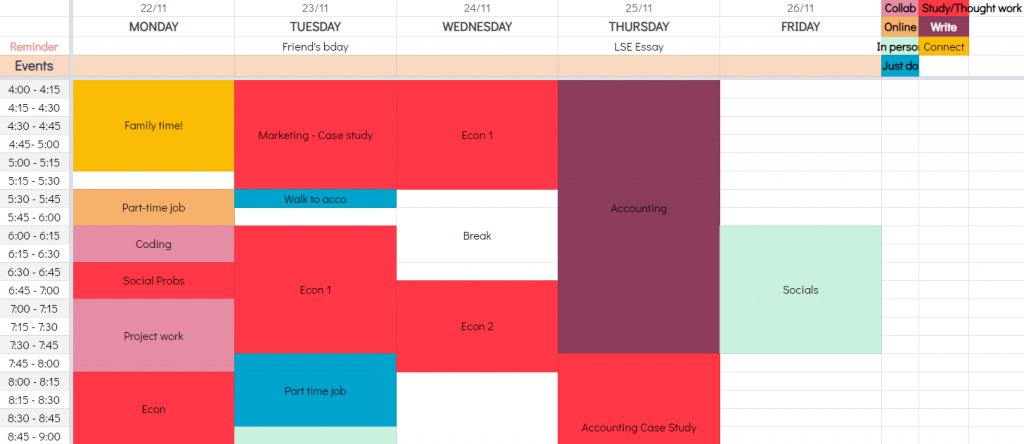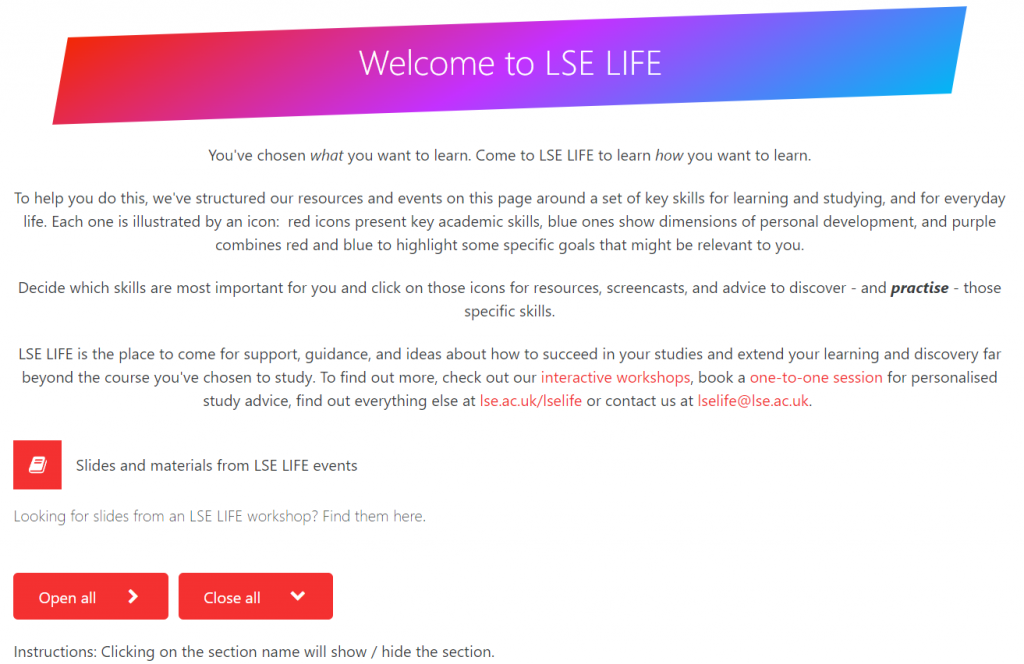It goes without saying that the syllabus and workload at LSE is one that requires you to spend a good amount of time on. For some, this comes naturally, but for most, it remains a skill in need of refinement. Before we dive in, I must say that that LSE LIFE has a set of useful resources on Moodle (accessible once you are a student). It is worth spending some time right at the beginning of term to use the principles during term time.
This blog talks about a few tips to use during term time. Note: this does not go into the metacognitive specifics of how to rethink your relationship with time, or even delve into the domain of what time management really is. I limit myself to a few tried and tested tips on managing your time so that you can make the most out of the term, what LSE, your course, and your cohort have to offer.
1) A weekly plan is your best friend
I cannot begin to tell you how much I love this technique. A weekly plan is quite simply a plan of all that you have planned for the week. This is by no means limited to your study times. It includes (and in fact starts with) all your activities including your hobbies, downtime, events, etc. in addition to time you allocate to your classes, writing, reading, etc.
Making your plan for the week will help you see what activity you want to trim or lengthen and what you should do more or less of. Eg: If you see that a majority of your time goes into studying and not enough networking, you know what to do differently next week. I am a “Google Sheets” kind of a person, so I really enjoy just copy-pasting my template into new tabs and filling them up. But you do you. A hand-written one works just as well! Here’s a snippet of my template filled out with my schedule some time during the middle of the Michaelmas Term.

Pro tip: Check out and add on events from LSE Life, LSE Career Hub, and LSE Events each week and add on events of your choice to your Weekly plan for a holistic set of events!
2) Check time management strategies
Now, this is a vague pointer and very purposefully designed to be so. Given the number of strategies, schools of thought, and books out there, it is worth spending some time going through some of this to see what resonates with you. To start off, here are some techniques that are quite popular: Pomodoro technique – which suggests that you spend 25 minutes on a topic with no distractions and then take a break and Time chunking – different variations exist, but essentially, we allocate blocks of time to each activity and move on at the end of that block. There is also a multitude of apps that can help you focus on one activity at a time.
3) Prioritize reading
Here’s a game-changer: you need not read everything given to you. Now take this with a pinch of salt. The caveats and nuances of this statement cannot be explained in their entirety within this limited number of words. But if you have gotten the hang of understanding what the reads are here to do for you, take a call as to whether a reading is relevant to your long-term goals, or if it even interests you. If neither scream “yes”, and you really don’t have the time, skip it and return at a later time.
4) Teamwork makes the dreamwork
Group studies help. Simply put, finding a partner/partners whom you resonate with and splitting your studies with them goes a long way in reducing your time spent on reading. You get x times the number of hours you spend reading, where x denotes the number of people who are in your study group including you (Is it visible that I’m a STEM girl at heart?). Go about doing your set of the reading, making the notes, and getting ready to explain. Not only does this save time, but this also helps you strengthen your side of the reading, because explaining it to someone makes the concept clearer for yourself as well.

5) LSE LIFE’s “Read” section.
This was a game-changer for me. Spending the first 40 minutes of the start of term, really saved me at least an hour off each subject each week. The resources under the “Read” can be found on Moodle and help you navigate all aspects of your LSE journey. This includes strategies to use to engage with your text in a conducive way without spending all of your time on it. Just type in “LSE LIFE” onto the search bar on Moodle and subscribe to it to start your learning journey.






